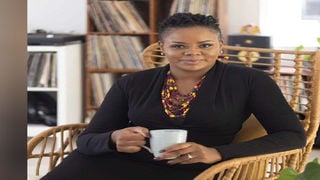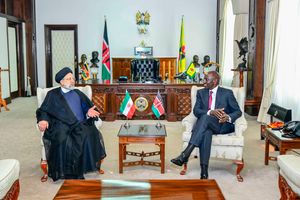
Muthoni Laibuta, Haleon’s Business Unit Director for Oral Care. PHOTO | POOL
|Life & Style
Premium
Muthoni Laibuta: The C-suite in a foreign land
A great deal of the smiles and general oral care for millions of Southeast Asians and Taiwanese particularly lies in the hands of Muthoni Laibuta. A wild allegation at first glance but not too far removed, seeing as Haleon’s Business Unit Director for Oral Care, Muthoni is responsible for the profit and loss and portfolio that contributes significantly to the company’s revenue.
Many years ago, as a young woman with a small girl, she packed her life and took a job with Unilever in Vietnam. It was new and bewildering and mostly sobering. Every turn had a lesson; not all of them were great. Over the past 14 years, Southeast Asia has been home, and there, she has built a formidable career as a marketer and strategist, an executive coach, and a speaker working with the C-suite and Founders, a management consultancy.
She is Haleon’s youngest regional business unit director in Southeast Asia and Taiwan. “I’m also the only black executive in Helion’s Asia Pacific block. And I made it to director when I was 29,” she says. “This wouldn’t have happened without the help of strong female influences in my life.”
We’ll start by discussing how you landed there [Southeast Asia]. I think that’s very crucial.
I landed in Malaysia after living in Indonesia for about two and a half years. Before moving to Southeast Asia, I was working for GSK in East Africa and the islands. I wanted to have international experience and to go into a bigger market, a bigger role. While working for GSK, I spent less than a year in Vietnam. So, Southeast Asia was my first choice. That’s how I ended up in Malaysia five years later.
What do you love about it?
It’s where I met my husband two years ago. So, it has centred me in that sense. I love that it’s cosmopolitan and a melting pot for different nationalities. It is unlike Indonesia, where I didn’t know the language, it was hard for me to connect and network. Not so for my daughter. She thrived in school and made friends. I wanted to move to a place where we would both be comfortable.
And how did you meet your husband here?
So, we have two versions of the story. Do you want the official version for the newspaper, or do you want the unofficial version? The spicier version? [Chuckles]
The raw one.
When Covid-19 hit, having been a single parent and single person for a very long time - nine years - I decided it was time to venture out and start dating again. My friends teased me about it a lot, and they started a Tinder profile on my behalf. My husband was also on Tinder, and when we connected, it turned out that we had a mutual friend. I don’t know whether it was because of Tinder or because of our mutual friend that we got connected, but I guess the universe orchestrated for us to meet. We had our first date at my house because of Covid-19 restrictions. That was new because I hadn’t introduced my daughter to anyone until then.
But it turned out okay because they are BFFs (best friends forever).
How did you find dating to have changed after nine years or ten years?
Oh, God, I was such a rookie, but I took a scientific approach. I am pretty geeky, so I read books on how to put myself out there. I also listened to podcasts on how to find the right mate and project myself so that I would find someone who’s nurturing and loving, someone I could see myself building a future with. I was very intentional when I went back to dating. And it was a learning experience about myself.
When I started, I thought I needed to find someone who ticked everything on my list. But then I went on a journey of self-discovery. I narrowed my search to just a few areas; What can’t I stomach? What would be the ideal values I would want to share with someone who would co-parent with me? Books and podcasts helped a great deal.
What has surprised you most about your career?
When I got pregnant at 22, I was so scared that I would either amount to nothing or have to settle for average. But I was blessed to have strong women around me who told me, ‘honestly, with your trajectory and your aptitude, there’s no way in hell that you should settle for average.’
I remember my mom telling me that pregnancy and single parenthood were not diseases. Then there was my late grandma who told me, ‘You have hands, you have legs, you have a brain, and you’re going to make it work for your daughter as well as yourself.” So, I was surrounded by female mentors and sponsors along the way.
They have been my source of strength. They have made me who I am today; Helion’s youngest regional business unit director in Southeast Asia and Taiwan. I’m also the only black executive in the Asia Pacific block. And I made it to director when I was 29. So, when I look back, the most surprising thing was growing up professionally with my daughter alongside me. I need a moment to breathe. I didn’t expect these questions. [Laughs]
I’ve not heard about your father...
My dad has been a pillar of strength. As a male figure, he surpassed all my expectations. He and my brother were there for me when my daughter was very young. I still catch up with my dad at least once a week or once every two weeks. You actually interviewed him at one point, Kibaya Imana Laibuta. He’s the blind judge.
Oh, I remember him.
Yes. I credit him for my work ethic and resilience because mediocrity was not an option growing up under my father. Neither was average. When I fell pregnant, I thought I had disappointed him, but he took such a nurturing stance and filled that daddy void for my daughter. They have such a strong bond. I don’t even think my husband can ever match up to that. Because of him (my father), I felt seen, hard, and supported.

What do you remember about having a dad with visual impairment growing up?
I remember the fact that I did not feel it [disability] because he was independent around the house. And because of that, I often struggled with being around men who were not as independent because even with his disability, he would fix his coffee, warm his food, take back the dishes to the kitchen, and serve his beer... He sorted himself out, never calling for his children to do stuff. So that’s one thing I remember and cherish.
The other was he was a present dad. He never missed my significant life events; even when I was disciplined in high school and almost suspended, he showed up to listen. He’s always there. I never felt that disability; in fact, I only became aware of it when other people were around him. I had a normal childhood; we never lacked, and we had enough to go on holiday. I felt the pressure, though, because he went and had a PhD. [Laugh] And then joined the Judiciary and started playing golf. What excuse did we have with our faculties intact?

Has your skin colour been apparent since you started working in Southeast Asia?
Oh, my God! Yes! Not just my skin colour but my anatomy. Currently, we are going through a phase with my daughter, who is developing an African figure, bum and all, in a country where everyone else is, you know, not as blessed. I strive to teach her to own her identity and beauty.
Personally, when I was in Vietnam working with Unilever, I was the only black person in a 15-kilometre radius. When I used to turn up for market visits, the whole market would stop. People would stop selling to look at me, touch my skin, and pull my hair. I was 24 and didn’t understand that it was essentially ignorance. I was the first black person that they had encountered. So, it was a novelty to them.
It was rather challenging to deal with my personal space being invaded without question. And when my daughter came to visit, people would yank her from my arms, wanting to hold this child who looked different, but as a baby, she never felt it. She enjoyed their attention. But that’s when it hit me hard. I couldn’t do more than my fair share of the assignment. I went back home after, I think, six months instead of a nine-month assignment.
Indonesians were friendlier, but there was still some reservation. I couldn’t get a nanny, for instance, because nobody wanted to work for a black person. I had to lean on referrals to get someone to care for my child. It was the same thing with even landing a driver. Thankfully, one was allocated by my employer.
All these experiences fashioned my resilience because I know the person starts from ignorance. In Malaysia, people are surprised at what I do and that I have the job. Often, they ask, ‘Where did you go to school?’ I’m more intolerant of anyone who wants to disrespect me.
What have you done in your life that has shocked you in a good or bad way?
I have a 12-year-old who’s very level-headed and thinks she’s 30. Often, when one takes the path of single parenting, they expect disaster, but she’s exactly what I needed. She’s very independent. The other thing that shocked me was getting married, and if it hadn’t been for Covid-19, I don’t think I would have gotten married. Covid-19 made me think about life beyond the corporate space.
I also always saw myself as not a cat lady but a dog lady. I had planned my post-retirement life on a beach, but now that I have someone else, I have to create room mentally, emotionally, and even in my bed, which still shocks me. Even my friends and family were shocked. The last surprise was going to a foreign land and creating a life there. And I’m happy.
What version of yourself are you currently pursuing?
I want to tell stories about African women in the diaspora. People romanticise life abroad. But it’s hard for most people and more challenging when you’re a woman. When I look at Asia Pacific, we are few and far between. We are unicorns. So, how exactly do we pave the way for those coming after us? Are we tackling the systemic issues, be they racism, access to credit, or even housing? I remember when I moved to Malaysia, my real estate agent told me that I had to give my full CV. ‘You have to tell me where your child is going to school. You must have a recommendation letter from your employer because few people will rent a house to a black African woman.’




